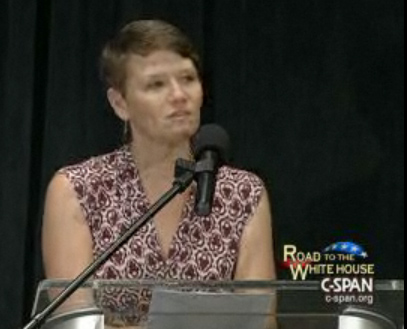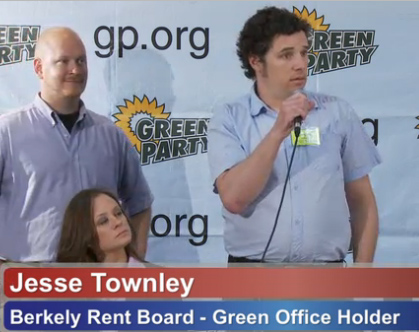Press Release: The Green Party of United States Nominates Dr. Jill Stein for President; Elected California Greens Speak on Coalition Building and Winning Elections
News Advisory
SACRAMENTO (July 16, 2012) - This past weekend, the Green Party of the United States held its Presidential Nominating Convention in Baltimore, MD and chose Dr. Jill Stein of Massachusetts as its 2012 Presidential Nominee.
Stein received 66% of all delegates' votes, easily surpassing the simple majority threshold needed to win the nomination. Actress/comedienne Roseanne Barr, who did not appear at the convention, finished second with 25%, followed by Dr. Kent Mesplay of San Diego with 6% and Harley Mikkelson of Michigan with 1%.
In a wide-ranging nationally broadcast acceptance speech, Stein offered a Green New Deal for America that would confront climate change, provide for a Medicare-for-All universal health-care system, eliminate unemployment through a Green jobs program, provide tuition free higher education, bring the troops and “war dollars” home, repeal the PATRIOT Act , replace free-trade agreements with fair-trade agreements, end big bank bailouts, legalize Marijuana, restore the Glass-Steagall Act, and amend the Constitution to end corporate person-hood. Pointing to the undue influence of big money on politics, Stein declared that Money is not Speech, “Those rights belong to living breathing human beings like you and me.”
The Convention not only brought Greens together from across the United States, but reflecting the global nature of the Green Party movement, was also attended by Green Party members from Africa, Europe, Asia-Pacific and the Americas.
California's delegation voted as apportioned by the results of its June 5th Primary Election, awarding 28 votes to Stein, 22 votes to Barr, and 6 votes to Mesplay. The votes were presented by Alex Shantz, Jennifer Muir and Maxine Daniel from the party's Student/Youth and LGBT communities.
Stein's nomination for Vice President, formerly homeless Anti-Poverty Activist Cheri Honkala of Pennsylvania, was also enthusiastically approved by acclamation by the delegates following Stein's victory in the first round of voting.
“I am so very honored to be your nominee and to be running on the ticket with Cheri Honkala,” Stein declared before the packed convention hall. Blasting the Democrats and Republicans for upholding similar pro-corporate policies that have led our country down a destructive path, she said “[They] have taken turns leading the way. While party labels change the policies stay the same.”
At the same time, referring to the numerous political uprisings around the country, from Occupy Wall Street to the Teacher's Union Strike in Wisconsin. “Something incredibly wonderful is happening across the America. We will create an unstoppable movement. And we won't rest until we have turned the White House into a Green House.
A physician from Massachusetts, Stein originally got involved with politics after she saw that the problems preventing her from caring for her patients were beyond the decisions she could make as a doctor; from pollution, to poverty and crime, “I am practicing political medicine, because it is the mother of all illnesses.”
Honkala, a former Green candidate for Sheriff of Philadelphia who ran on stopping home foreclosures of victims of the Wall Street-induced housing crisis, spoke on the importance of brining the issues effecting working class Americans to the debate, “I can bring to this campaign a human face. The p-word is poverty, an issue that has not been talked about by Mitt Romney or President Obama.”
 Before the votes were cast, Fairfax, California Green Mayor Pam Hartwell-Herrero spoke about the accomplishments of her city's Green city council majority, the only current such Green majority in the United States. Demonstrating that Greens not only have good ideas but can govern, she touted their success in passing a local living wage, a ban on national chain stores, and moving the City's public-funds from Bank of American to the local Bank of Marin.
Before the votes were cast, Fairfax, California Green Mayor Pam Hartwell-Herrero spoke about the accomplishments of her city's Green city council majority, the only current such Green majority in the United States. Demonstrating that Greens not only have good ideas but can govern, she touted their success in passing a local living wage, a ban on national chain stores, and moving the City's public-funds from Bank of American to the local Bank of Marin.
Hartwell-Herrero also showed off the “Fair Buck,” a local Fairfax currency that was created through a coalition-building partnership between a local non-profit organization the Chamber of Commerce, and the City Government, that enables the community to keep money local, generate funds for local projects, and start a conversation about economic alternatives. At least one Green have been on the Fairfax city council since 1999. After advocating such policies to the local community, now four out of five members are Greens.
The Convention spanned four days and included workshops on outreach, organizing, campaign training and fundraising, as well as a press conference featuring Green elected officials and candidates for municipal, state and federal office across the country. Convention coverage included a front page feature in the New York Times and an extended interview on C-SPAN's Washington Journal.
During one workshop, Berkeley Green Rent Board member Jesse Townley delivered a speech on building progressive electoral coalitions. “Every election we have a coalition of people who are running for the rent board, school board and city council, that brings together Greens, progressive Democrats, Peace and Freedom Party members and non-affiliated voters, all on the progressive side, working together.” At least one Green has been on the Berkley Rent Board since 1998 and currently three of the nine members are Greens. Townley credits this to Greens working within larger coalitions for social change, and to those working for social change who see the Greens as an electoral vehicle for their movements. Thirty-five California Greens currently hold elected office.
The convention also updated the GPUS platform, including adding a call for a publicly-funded People’s Commission on Presidential Debates, open to all presidential candidates who appear on at least as many ballots as would represent a majority of the Electoral College and who raise enough funds to otherwise qualify for general election public financing. Any candidate who refuses to participate in such debates would lose general election public financing for their candidacy. Federal law would also be amended to remove the non-profit tax exemption status that allows corporations to fund the existing Commission on Presidential Debates and other such exclusive privately-controlled debate entities.





